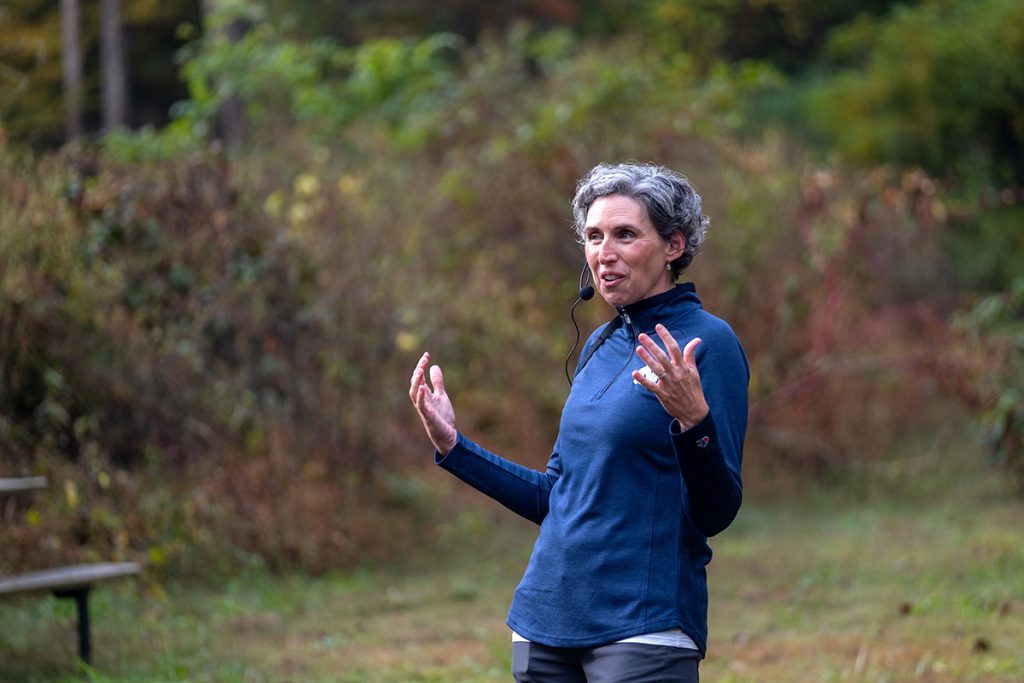
Funding from the state legislature has boosted an economic development project in western North Carolina centered on outdoor recreation. UNC faculty and students have been providing expertise to the collaborative partnership.
In perfect timing with North Carolina’s “Year of the Trail,” an academic-community collaborative creating change in Old Fort recently got some great news. The state legislature allocated $2.5 million to complete a 42-mile trails project in the Pisgah National Forest that surrounds the mountain town.
Old Fort was a fall stop on the western route of the Tar Heel Bus Tour in which tour participants learn about Carolina’s impact on the state. UNC-Chapel Hill faculty members and senior administrators learned about the University’s ongoing contributions to the project as they visited the historic train depot and Old Fort Gateway Trailhead.
Jennifer Gates-Foster, an associate professor of classics and archaeology in the College of Arts and Sciences, is a leader in the partnership group, the Catawba Vale Collaborative. She said that the state funding, included in the budget the legislature approved this fall, will enable collaborators to focus on larger issues surrounding equitable economic development. In summer 2022, the initial six miles of the trail system — the accessible, multi-use Gateway Trails — were completed. A year later, the 3.16-mile Bernard Mountain Trail opened for hiking and mountain biking enthusiasts.
“This creates space for the team to look at the effects of the trails in a more reflective way,” Gates-Foster said. “As we look forward to future economic development, that stability of knowing the trails will happen gives us the opportunity to think about our work in the long term rather than just cycle to cycle in terms of grant funding.”
Carolina faculty members, undergraduate and graduate students are contributing to work through the Catawba Vale Collaborative, which includes community-based organizations Camp Grier and its G5 Trail Collective, Eagle Market Streets Development Corporation, People on the Move Old Fort and the U.S. Forest Service Grandfather District.
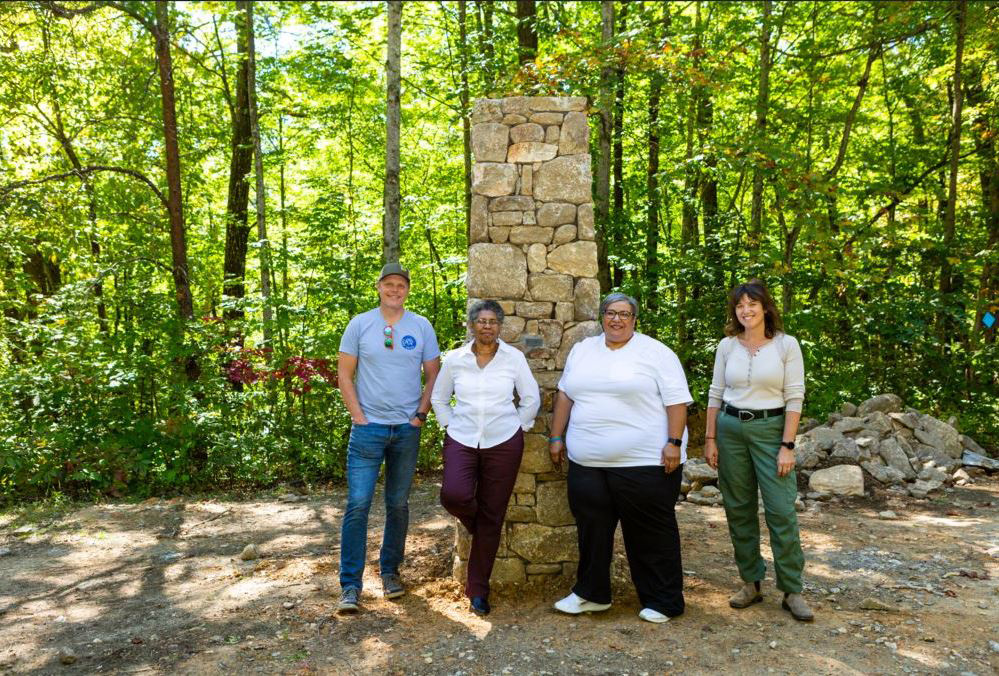
Stone pillars have been placed at three reflective points on the trails, and Gates-Foster and UNC archaeologists are working with the forest service and local American Indian and African American communities to create interpretive panels to be placed on the pillars. This signage will bring to light the history and stories of those communities and their ongoing stewardship of the forest.
This past summer, UNC archaeologists also completed National Environmental Policy Act clearances — required federal assessment work on the environmental impacts of land development — to help move forward phase three of trail development.
Two transformative projects are also being supported by investment in the trails. Camp Grier’s Grier Village will add 75,000 square feet of community-focused lodging, student housing and classroom spaces. Eagle Market Streets’ Innovation Hub will offer a commercial facility featuring a state-of-the-art film studio, commissary kitchen, meeting space and manufacturing facility.
Public policy research adds value
William Goldsmith, a native of Old Fort, is a teaching assistant professor and director of undergraduate studies in UNC’s department of public policy. For the second year, he’s been a history commentator on the Tar Heel Bus Tour.
Goldsmith has also directed two semesters of public policy students’ senior capstone projects focused on Old Fort.
“Some of our most meaningful work in public policy goes into supporting these students who are engaging with nonprofits and state agencies as they apply their skills in public policy analysis to serve the state of North Carolina,” he said. “The capstone projects are also a real bridge for them in transitioning into the working world.”
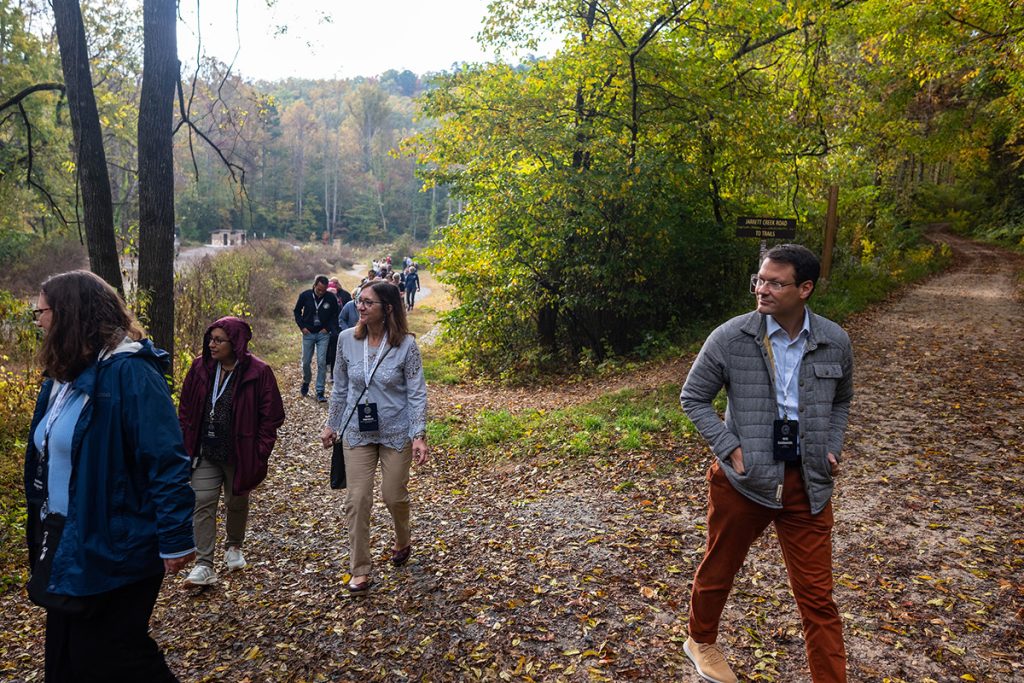
Nick Long graduated in 2023 with undergraduate majors in public policy and peace, war and defense and a minor in history. He’s now pursuing a master’s in public policy at Carolina and was part of the first team’s capstone project in fall 2022.
Long’s team wanted to address two questions: Is outdoor recreation a viable form of economic development for small towns, and can rural economic development be executed equitably?
Long’s internship at Gov. Roy Cooper’s Hometown Strong Initiative proved valuable. The team interviewed the initiative’s chief of staff to seek his insight on rural economic development. Hometown Strong is dedicated to supporting rural counties of North Carolina and providing those residents with resources and support to improve their quality of life.
In examining success stories outside the state, Long’s team learned about the Caliente Mountain Biking Association in Caliente, Nevada, and the economic impact of mountain biking on that town.
“I am hopeful that the work we did helped to bring attention to Old Fort’s need for funding,” said Long, who called the capstone experience “the most impactful class of my undergraduate career.”
“The capstone is the culmination of everything you’ve learned and an opportunity to apply those skills and knowledge for a real-world client,” he said.
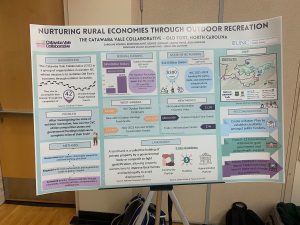
Caroline Voegele’s team in spring 2023 expanded on the foundational work of the initial capstone team. She graduated in May and now works as a New-York-based investment banking analyst for Citi.
The history and public policy double major said her team wanted to give the Catawba Vale Collaborative actionable items they could use when applying for funding. Key takeaways including encouraging leaders to develop a master plan to establish credibility with public funders and to create educational alliances to gain government and philanthropic support. West Virginia University’s Outdoor Recreation Center, one of their case studies, has had success in garnering support by stressing the impact of outdoor recreation on youth development, Voegele said.
“How do you communicate about economic development and about sustainability? These were some of the questions we wanted to address,” Voegele said. “We recommended that if you have a master plan on hand, it gives you clear direction.”
Voegele said contributing to the work going on in Old Fort and partnering with community leaders was “incredibly meaningful.”
“It’s rewarding to see something you’ve done make such a positive impact on Old Fort,” she said. “The people we spoke with are so kind and dedicated, and I have so much respect for them.”
Creating trail school curricula
In advancing collaborative efforts with Old Fort, Gates-Foster will be developing a heritage module for McDowell Tech Community College’s new trail construction school. She received a grant from the College of Arts and Sciences’ Office of Diversity, Equity and Inclusion to support that work.
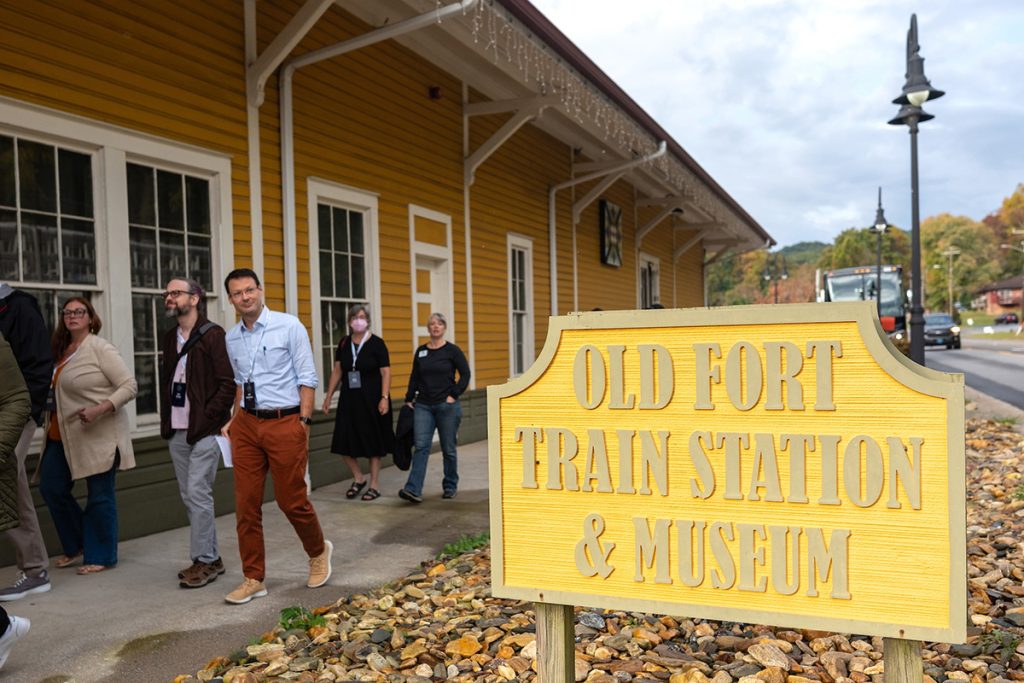
She will work in concert with faculty in UNC’s Research Laboratories of Archaeology to create content for the trails program that encourages awareness of cultural resources in trail design and construction as well as aspects of interpretation and storytelling.
“What do trails mean for communities, and how does trail-building impact a community’s sense of itself and its history?” said Gates-Foster, who values community-engaged scholarship. “I’m grateful for the grant that will support some of this work.”
Gates-Foster said eventually UNC graduate students might be involved in teaching in the trails program. She also envisions a second phase of curricular development — creating lesson plans for K-12 teachers about the trails.
“The trail school in Old Fort is one of only a handful that exist nationally. This curricular work is driven by something the Old Fort community told us they needed and valued,” she said. “It is really satisfying to be able to do something that can make an impact right away on the ground.”
By Kim Spurr ’88, College of Arts and Sciences
Anthropology graduate student Cayla Colclasure has also been conducting research in Old Fort on the western North Carolina Railroad. Explore her visual story map of the town’s African American history.
Read previous stories on UNC’s work in Old Fort:
Prison camps and the Western North Carolina Railroad
